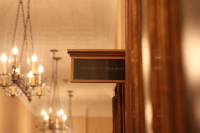Lordan served in this role since his arrival in April 2000. In fact, according to the statement, he was the first and only person to ever serve in this role, as it was created just prior to his arrival.
“John has overseen many improvements to the University’s financial operations, including the creation of a chief investment officer’s position, more rigorous accounting procedures, and school-based budgeting,” the statement reads.
According to the statement, he was able to oversee the expansion of Fordham’s endowment and a few years of budget surpluses, but in recent years, he has had to manage a very tight budget.
Last October, Lordan spoke at the University’s planning and budgeting meeting for the upcoming fiscal year 2014-2015 and described how Fordham had to readjust and allocate funds to “make ends meet.”
In V. 95, I. 16, of The Fordham Ram Lordan said, “Eight out of 10 schools failed to achieve budgeted tuition and fee revenue. It’s rare that so many [schools] went in a single direction.”
This created a budget gap during the 2013 year of $5.2 million. The projections for the 2014 fiscal year were not exactly glowing. The Fordham Ram reported that according to the Board of Trustees’ Financial Plan for 2014-2015, “the revenue problem only gets worse in fiscal 2014 and beyond.”
At that meeting, Lordan also discussed growing university expenses, the largest portion of which is devoted to faculty salaries and benefits. According to the financial plan, over $300 million is devoted to salaries, wages and fringe benefits for the faculty and staff in the 2014 budget.
Even at that time, according the article, the faculty was upset by the proposal.
“This budget is more for buildings than for people,” Henry Schwalbenberg, Ph.D, associate professor of international political economy and development, said last October.
Still, Lordan and the Board of Trustees remained optimistic at the time, as according to the financial plan, the university expects to bring in around $504.8 million in revenue and plans to spend about $504.7 million. This would bring the books back into balance without dipping into the reserve funds, which was one of the problems this past fiscal year.
That seemed to be the precursor to the estranged relationship between the faculty and the administration. (See Faculty, Admin Remain at Impasse)
Lordan had been representing the university in negotiations with the Faculty Senate over a new health care plan. Lordan attended a faculty-wide meeting on Wednesday, Sept. 10, was asked to leave and declined. He was censured by the Faculty Senate for his refusal.
The Faculty Senate voted, 22-0-0, to censure Lordan on Friday, Sept. 12. According to the Senate’s action minutes, Lordan was censured for “for violating the University Code of Conduct (Statutes, 6-03.01[h]) by disrupting the University-wide faculty meeting held on September 10, 2014; by limiting through intimidation the free expression of ideas by members of the faculty; and by refusing a request by officers of the Senate to leave the meeting.”
Further, the Senate voted 14-4-3 to pass a resolution saying the Senate had “no confidence in Mr. Lordan,” and requested “that the President of the University directly represent the Administration in negotiations concerning faculty salaries and benefits.”
The university declined to comment on the censure.
Rev. Joseph M. McShane, S.J., president of the university, has since been in meetings with the Faculty Senate, one last Friday and one early Tuesday morning.
According to the university, they are conducting a nationwide search to fill the position, while Frank Simio, vice president for finance will temporarily fill the void.
The Fordham Ram reached out to Mr. Lordan after the statement was released but received a “mail error” message in return. Mr. Simio politely declined to comment on his situation at the moment.
Kelly Kultys is the Editor-in-Chief & Max Prinz is the Sports Editor of The Fordham Ram.





